My News and Reviews
So, last week was the Rumiko Takahashi Manga Moveable Feast. I hope you all had a good time; I know I did! I even managed to devote each of my posts last week to the Feast in one way or another. I took a quick look a several of Takahashi’s manga and anime adaptations of her work. I also posted my second in-depth manga review for April: Mermaid Saga, Volume 1. And as a reminder, April’s manga giveaway, Return of Ranma, is for the first two volumes of Ranma 1/2. The winner will be announced Wednesday, so get your entries in!
Next month’s Manga Moveable Feast will feature Mitsuru Adachi’s Cross Game. Derik Badman at The Panelists will be hosting.
Quick Takes
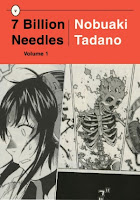 7 Billion Needles, Volume 1 by Nobuaki Tadano. Based on Hal Clement’s 1950 novel Needle, the first two volumes of 7 Billion Needles are currently under consideration for the 2011 Eisner Award for Best Adaptation from Another Work. I haven’t read Needle so I can’t say how 7 Billion Needles compares, but I’m always glad to see manga nominated for comics awards. I’m impressed that this is Tadano’s debut work—the artwork, characterization, and pacing of the plot in the first volume are excellent. While mostly serious in tone, there are some great moments of humor. I find it interesting that becoming a host for an alien being actually forces Hikaru to become less alienated from her classmates.
7 Billion Needles, Volume 1 by Nobuaki Tadano. Based on Hal Clement’s 1950 novel Needle, the first two volumes of 7 Billion Needles are currently under consideration for the 2011 Eisner Award for Best Adaptation from Another Work. I haven’t read Needle so I can’t say how 7 Billion Needles compares, but I’m always glad to see manga nominated for comics awards. I’m impressed that this is Tadano’s debut work—the artwork, characterization, and pacing of the plot in the first volume are excellent. While mostly serious in tone, there are some great moments of humor. I find it interesting that becoming a host for an alien being actually forces Hikaru to become less alienated from her classmates.
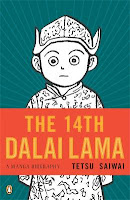 The 14th Dalai Lama: A Manga Biography by Tetsu Saiwai. The 14th Dalai Lama isn’t a bad manga by any means, it just wasn’t as good as I was hoping it to be. It doesn’t really seem to have a strong narrative flow to me. Instead, it’s almost as if the manga is simply an illustrated time-line and listing of facts. I think I was hoping for something a little more engaging. However, I did find Saiwai’s simple art style to be very appealing. Also, kudos for the inclusion of a bibliography. The 14th Dalai Lama makes for a fine introduction to the historical events surrounding Tibet and the Dalai Lama. The manga doesn’t focus on any one aspect in depth but provides a broad overview of the situation. I could easily see this book being used as a text in a history class.
The 14th Dalai Lama: A Manga Biography by Tetsu Saiwai. The 14th Dalai Lama isn’t a bad manga by any means, it just wasn’t as good as I was hoping it to be. It doesn’t really seem to have a strong narrative flow to me. Instead, it’s almost as if the manga is simply an illustrated time-line and listing of facts. I think I was hoping for something a little more engaging. However, I did find Saiwai’s simple art style to be very appealing. Also, kudos for the inclusion of a bibliography. The 14th Dalai Lama makes for a fine introduction to the historical events surrounding Tibet and the Dalai Lama. The manga doesn’t focus on any one aspect in depth but provides a broad overview of the situation. I could easily see this book being used as a text in a history class.
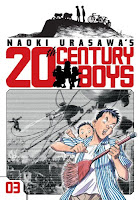 20th Century Boys, Volumes 3-6 by Naoki Urasawa. One of Urasawa’s great skills is the ability to give a reader just enough information to be able to follow the story and want to know more about what is happening without seeming to reveal anything about what is actually going on. Some plot elements stretch credibility, but the story is addictive and has great characters. I’m particularly fond of Kenji and Shogun and…well, just about everyone. What I really like about 20th Century Boys is how Urasawa plays with the manga’s chronology and the characters’ memories. The various threads are slowly being brought together and it’s fascinating to watch how the different timelines interact with one another.
20th Century Boys, Volumes 3-6 by Naoki Urasawa. One of Urasawa’s great skills is the ability to give a reader just enough information to be able to follow the story and want to know more about what is happening without seeming to reveal anything about what is actually going on. Some plot elements stretch credibility, but the story is addictive and has great characters. I’m particularly fond of Kenji and Shogun and…well, just about everyone. What I really like about 20th Century Boys is how Urasawa plays with the manga’s chronology and the characters’ memories. The various threads are slowly being brought together and it’s fascinating to watch how the different timelines interact with one another.
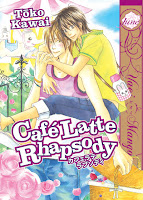 Café Latte Rhapsody by Tōko Kawai. This was a sweet and sort of goofy boys’ love one shot. Not goofy as in funny, but more like cute and awkward (very awkward). I initially picked up the manga because the main character, Hajime, works in a bookstore. He has a bubbly and likeable personality. Keito, on the other hand, unintentionally scares people away until they take the time to get to know him. The two turn out to be very good for one another as they both have self esteem issues to work through. I do wonder if Keito is actually in love or if he’s just attaching himself to the first person he feels completely comfortable around. Granted, that can often be the same thing.
Café Latte Rhapsody by Tōko Kawai. This was a sweet and sort of goofy boys’ love one shot. Not goofy as in funny, but more like cute and awkward (very awkward). I initially picked up the manga because the main character, Hajime, works in a bookstore. He has a bubbly and likeable personality. Keito, on the other hand, unintentionally scares people away until they take the time to get to know him. The two turn out to be very good for one another as they both have self esteem issues to work through. I do wonder if Keito is actually in love or if he’s just attaching himself to the first person he feels completely comfortable around. Granted, that can often be the same thing.
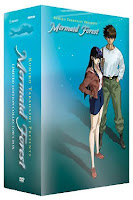 Mermaid Forest directed by Masaharu Okuwaki. Last week I read Rumiko Takahashi’s Mermaid Saga and fell in love with it. So I decided to track down another version of the work. It’s not quite as effective as the source material, but Mermaid Forest is a pretty good adaptation and offers some new details. The thirteen episodes (although only the first eleven were aired on television) cover all but one of the stories from Mermaid Saga. Overall, I liked the character designs but didn’t find the animation itself to be particularly notable, although it gets better as the series progresses. They did attempt to tone down some of the blood and violence, particularly in the early episodes, but the visual adjustments aren’t convincing.
Mermaid Forest directed by Masaharu Okuwaki. Last week I read Rumiko Takahashi’s Mermaid Saga and fell in love with it. So I decided to track down another version of the work. It’s not quite as effective as the source material, but Mermaid Forest is a pretty good adaptation and offers some new details. The thirteen episodes (although only the first eleven were aired on television) cover all but one of the stories from Mermaid Saga. Overall, I liked the character designs but didn’t find the animation itself to be particularly notable, although it gets better as the series progresses. They did attempt to tone down some of the blood and violence, particularly in the early episodes, but the visual adjustments aren’t convincing.
 The Taste of Tea directed by Katsuhito Ishii. This is such a strange and surreal film. The Taste of Tea has won quite a few awards. I probably didn’t totally get it, but I did enjoy watching it immensely. The cinematography is beautiful and the visuals are marvelous. The Haruno family is made up of some very unique and colorful individuals but they obviously love one another despite their differences. It’s often difficult to say exactly where reality starts and ends and to what extent their stories are true and what is made up. But when all is said and done, it doesn’t really matter. The film is entertaining, touching, and heartfelt. I really like the Harunos—they seem to be a family that would be fun to know in real life.
The Taste of Tea directed by Katsuhito Ishii. This is such a strange and surreal film. The Taste of Tea has won quite a few awards. I probably didn’t totally get it, but I did enjoy watching it immensely. The cinematography is beautiful and the visuals are marvelous. The Haruno family is made up of some very unique and colorful individuals but they obviously love one another despite their differences. It’s often difficult to say exactly where reality starts and ends and to what extent their stories are true and what is made up. But when all is said and done, it doesn’t really matter. The film is entertaining, touching, and heartfelt. I really like the Harunos—they seem to be a family that would be fun to know in real life.

Speak Your Mind